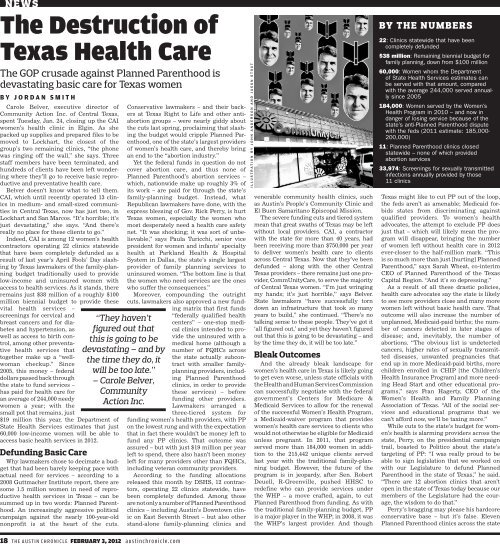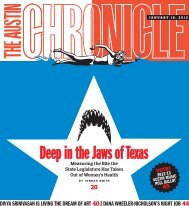Print Edition PDF - The Austin Chronicle
Print Edition PDF - The Austin Chronicle
Print Edition PDF - The Austin Chronicle
You also want an ePaper? Increase the reach of your titles
YUMPU automatically turns print PDFs into web optimized ePapers that Google loves.
NEWS<br />
<strong>The</strong> Destruction of<br />
Texas Health Care<br />
<strong>The</strong> GOP crusade against Planned Parenthood is<br />
devastating basic care for Texas women<br />
BY JORDAN SMITH<br />
Carole Belver, executive director of<br />
Community Action Inc. of Central Texas,<br />
spent Tues day, Jan. 24, closing up the CAI<br />
women’s health clinic in Elgin. As she<br />
packed up supplies and prepared files to be<br />
moved to Lockhart, the closest of the<br />
group’s two remaining clinics, “the phone<br />
was ringing off the wall,” she says. Three<br />
staff members have been terminated, and<br />
hundreds of clients have been left wondering<br />
where they’ll go to receive basic reproductive<br />
and preventative health care.<br />
Belver doesn’t know what to tell them.<br />
CAI, which until recently operated 13 clinics<br />
in medium- and small-sized communities<br />
in Central Texas, now has just two, in<br />
Lockhart and San Marcos. “It’s horrible; it’s<br />
just devastating,” she says. “And there’s<br />
really no place for these clients to go.”<br />
Indeed, CAI is among 12 women’s health<br />
contractors operating 22 clinics statewide<br />
that have been completely defunded as a<br />
result of last year’s April Fools’ Day slashing<br />
by Texas lawmakers of the family-planning<br />
budget traditionally used to provide<br />
low-income and uninsured women with<br />
access to health services. As it stands, there<br />
remains just $38 million of a roughly $100<br />
million biennial budget to provide these<br />
vital health services –<br />
screenings for cervical and<br />
breast cancers and for diabetes<br />
and hypertension, as<br />
well as access to birth control,<br />
among other preventative<br />
health services that<br />
together make up a “wellwoman<br />
checkup.” Since<br />
2005, this money – federal<br />
dollars passed back through<br />
the state to fund services –<br />
has paid for health care for<br />
an average of 244,000 needy<br />
women a year; with the<br />
small pot that remains, just<br />
$19 million this year, the Department of<br />
State Health Ser vices estimates that just<br />
60,000 low-income women will be able to<br />
access basic health services in 2012.<br />
Defunding Basic Care<br />
Why lawmakers chose to decimate a budget<br />
that had been barely keeping pace with<br />
actual need for services – according to a<br />
2008 Guttmacher Institute report, there are<br />
some 1.5 million women in need of reproductive<br />
health services in Texas – can be<br />
summed up in two words: Planned Parenthood.<br />
An increasingly aggressive political<br />
campaign against the nearly 100-year-old<br />
nonprofit is at the heart of the cuts.<br />
“<strong>The</strong>y haven’t<br />
figured out that<br />
this is going to be<br />
devastating – and by<br />
the time they do, it<br />
will be too late.”<br />
– Carole Belver,<br />
Community<br />
Action Inc.<br />
18 T H E A U S T I N C H R O N I C L E FEBRUARY 3, 2012 a u s t i n c h r o n i c l e . c o m<br />
Conservative lawmakers – and their backers<br />
at Texas Right to Life and other antiabortion<br />
groups – were nearly giddy about<br />
the cuts last spring, proclaiming that slashing<br />
the budget would cripple Planned Parent<br />
hood, one of the state’s largest providers<br />
of women’s health care, and thereby bring<br />
an end to the “abortion industry.”<br />
Yet the federal funds in question do not<br />
cover abortion care, and thus none of<br />
Planned Parenthood’s abortion services –<br />
which, nationwide make up roughly 3% of<br />
its work – are paid for through the state’s<br />
family-planning budget. Instead, what<br />
Republican lawmakers have done, with the<br />
express blessing of Gov. Rick Perry, is hurt<br />
Texas women, especially the women who<br />
most desperately need a health care safety<br />
net. “It was shocking; it was sort of unbelievable,”<br />
says Paula Turicchi, senior vice<br />
president for women and infants’ specialty<br />
health at Parkland Health & Hospital<br />
System in Dallas, the state’s single largest<br />
provider of family planning services to<br />
uninsured women. “<strong>The</strong> bottom line is that<br />
the women who need services are the ones<br />
who suffer the consequences.”<br />
Moreover, compounding the outright<br />
cuts, lawmakers also approved a new funding<br />
matrix that first funds<br />
“federally qualified health<br />
centers” – one-stop medical<br />
clinics intended to provide<br />
the uninsured with a<br />
medical home (although a<br />
number of FQHCs across<br />
the state actually subcontract<br />
with smaller familyplanning<br />
providers, including<br />
Planned Parenthood<br />
clinics, in order to provide<br />
these services) – before<br />
funding other providers.<br />
Lawmakers arranged a<br />
three-tiered system for<br />
funding women’s health providers, with PP<br />
on the lowest rung and with the expectation<br />
that in fact there wouldn’t be money left to<br />
fund any PP clinics. That outcome was<br />
assured – but with just $19 million per year<br />
left to spend, there also hasn’t been money<br />
left for many providers other than FQHCs,<br />
including veteran community providers.<br />
According to the funding allocations<br />
released this month by DSHS, 12 contractors,<br />
operating 22 clinics statewide, have<br />
been completely defunded. Among those<br />
are not only a number of Planned Parenthood<br />
clinics – including <strong>Austin</strong>’s Downtown clinic<br />
on East Seventh Street – but also other<br />
stand-alone family-planning clinics and<br />
I L L U S T R A T I O N B Y J O H N A N D E R S O N A N D J A S O N S T O U T<br />
venerable community health clinics, such<br />
as <strong>Austin</strong>’s People’s Community Clinic and<br />
El Buen Samaritano Episcopal Mission.<br />
<strong>The</strong> severe funding cuts and tiered system<br />
mean that great swaths of Texas may be left<br />
without local providers. CAI, a contractor<br />
with the state for more than 40 years, had<br />
been receiving more than $750,000 per year<br />
to deliver women’s health care to clients<br />
across Central Texas. Now that they’ve been<br />
defunded – along with the other Central<br />
Texas providers – there remains just one provider,<br />
CommUnityCare, to serve the majority<br />
of Central Texas women. “I’m just wringing<br />
my hands; it’s just horrible,” says Belver.<br />
State lawmakers “have successfully torn<br />
down an infrastructure that took so many<br />
years to build,” she continued. “<strong>The</strong>re’s no<br />
talking sense to these people. <strong>The</strong>y’ve got it<br />
‘all figured out,’ and yet they haven’t figured<br />
out that this is going to be devastating – and<br />
by the time they do, it will be too late.”<br />
Bleak Outcomes<br />
And the already bleak landscape for<br />
women’s health care in Texas is likely going<br />
to get even worse, unless state officials with<br />
the Health and Human Services Commission<br />
can successfully negotiate with the federal<br />
government’s Centers for Medicare &<br />
Medic aid Services to allow for the renewal<br />
of the successful Women’s Health Program,<br />
a Medicaid-waiver program that provides<br />
women’s health care services to clients who<br />
would not otherwise be eligible for Medicaid<br />
unless pregnant. In 2011, that program<br />
served more than 184,000 women in addition<br />
to the 215,442 unique clients served<br />
last year with the traditional family-planning<br />
budget. However, the future of the<br />
program is in jeopardy, after Sen. Robert<br />
Deuell, R-Greenville, pushed HHSC to<br />
redefine who can provide services under<br />
the WHP – a move crafted, again, to cut<br />
Planned Parenthood from funding. As with<br />
the traditional family-planning budget, PP<br />
is a major player in the WHP; in 2008, it was<br />
the WHP’s largest provider. And though<br />
BY THE NUMBER S<br />
22: Clinics statewide that have been<br />
completely defunded<br />
$38 million: Remaining biennial budget for<br />
family planning, down from $100 million<br />
60,000: Women whom the Department<br />
of State Health Services estimates can<br />
be served with that amount, compared<br />
with the average 244,000 served annually<br />
since 2005<br />
184,000: Women served by the Women’s<br />
Health Program in 2010 – and now in<br />
danger of losing service because of the<br />
state’s anti-Planned Parenthood dispute<br />
with the feds (2011 estimate: 185,000-<br />
200,000)<br />
11: Planned Parenthood clinics closed<br />
statewide – none of which provided<br />
abortion services<br />
33,974: Screenings for sexually transmitted<br />
infections annually provided by those<br />
11 clinics<br />
Texas might like to cut PP out of the loop,<br />
the feds aren’t as amenable; Medicaid forbids<br />
states from discriminating against<br />
qualified providers. To women’s health<br />
advocates, the attempt to exclude PP does<br />
just that – which will likely mean the program<br />
will disappear, bringing the number<br />
of women left without health care in 2012<br />
ever-closer to the half-million mark. “This<br />
is so much more than just [hurting] Planned<br />
Parenthood,” says Sarah Wheat, co-interim<br />
CEO of Planned Parenthood of the Texas<br />
Capital Region. “And it’s so depressing.”<br />
As a result of all these drastic policies,<br />
health care advocates say the state is likely<br />
to see more providers close and many more<br />
women left without basic health care. That<br />
outcome will also increase the number of<br />
unplanned, Medicaid-paid births; the number<br />
of cancers detected in later stages of<br />
disease; and, inevitably, the number of<br />
abortions. “<strong>The</strong> obvious list is undetected<br />
cancers, higher rates of sexually transmitted<br />
diseases, unwanted pregnancies that<br />
end up in more Medicaid-paid births, more<br />
children enrolled in CHIP [the Children’s<br />
Health Insurance Program] and more needing<br />
Head Start and other educational programs,”<br />
says Fran Hagerty, CEO of the<br />
Women’s Health and Family Planning<br />
Assoc i ation of Texas. “All of the social services<br />
and educational programs that we<br />
can’t afford now, we’ll be taxing more.”<br />
While cuts to the state’s budget for women’s<br />
health is alarming providers across the<br />
state, Perry, on the presidential campaign<br />
trail, boasted to Politico about the state’s<br />
targeting of PP: “I was really proud to be<br />
able to sign legislation that we worked on<br />
with our Legislature to defund Planned<br />
Parenthood in the state of Texas,” he said.<br />
“<strong>The</strong>re are 12 abortion clinics that aren’t<br />
open in the state of Texas today because our<br />
members of the Legislature had the courage,<br />
the wisdom to do that.”<br />
Perry’s bragging may please his hardcore<br />
conservative base – but it’s false. Eleven<br />
Planned Parenthood clinics across the state

















